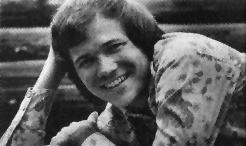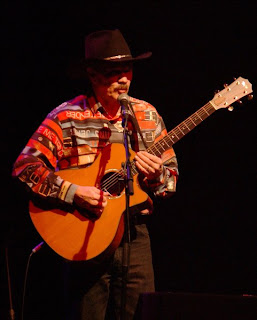David Gates, who was born in 1940, in Tulsa, Oklahoma, is best known as the lead singer of the group Bread. During the 1970s the group had numerous hits, and has been voted into the Vocal Group Hall of Fame. His soft style and sentimental lyrics combined to sell millions of records in the in America and Great Britain.
How did they come up with the name, Bread? When the band struggled to think of a name, they ran through a bunch of words and rejected them. They had wanted a name that started with a "B" like the Beatles and the Bee Gees, when a bread truck came along.
David's father was a band director and a piano teacher. No wonder, David became proficient in piano, bass and guitar by the time he enrolled in Tulsa's Will Rogers High School, and played with local bands around Tulsa. During a concert in 1957, his high school band backed Chuck Berry.
Around this time, Gates released his first local hit single, "Jo-Baby," a song he had written for his sweetheart, Jo Rita, whom he married in 1958 while enrolled at the University of Oklahoma.
In 1961, when he was 21 he, his wife and two babies moved to Los Angeles, where Gates continued writing songs, and he worked as a music copyist, as a studio musician, and as a producer for many artists — including Pat Boone. His composition "Popsicles and Icicles" hit #3 on the US Hot 100 for The Murmaids in January 1964. The Monkees recorded another of his songs, "Saturday's Child."
HIGHLY Recommended (Press album covers for direct links to Amazon):
-----
By the end of the 1960s, he had worked with many leading artists, including Elvis Presley, Bobby Darin, Merle Haggard, Phil Spector and Brian Wilson. In 1965, Gates arranged the Glenn Yarbrough hit, "Baby, the Rain Must Fall." In 1966, he produced two singles on A&M Records for Captain Beefheart and The Magic Band which were hits in the Los Angeles area.
In the meantime, Gates had been releasing singles of his own on several labels. "Manchester 101" "There's A Heaven/She don't cry 196?." "Mala 413" "You'll Be My Baby/What's This I Hear." "Mala 418" "The Happiest Man Alive/A Road That Leads To Love." Both In 1960. "Mala 427" "Jo Baby/Teardrops In My Heart." In 1961 "Planetary 103" "Little Miss Stuck Up/The Brighter Side." "Planetary 108" "Let You Go/Once Upon A Time." under the Pseudonym of "Del Asley" in 1965 & "Del-Fi 4206" "No One Really Loves A Clown/You Had It Commin' To Ya." He also released a single under the name of "The Manchesters" in 1965 on the Vee Jay Label.
In 1967, Gates produced and arranged the debut album of a band called The Pleasure Faire. A little over a year later, Gates and Pleasure Faire member Robb Royer got together with Jimmy Griffin to form Bread. The group was signed by Elektra, where it would remain for the eight years of its existence.
It released its first album, Bread, in 1969, which peaked at #127 on the Billboard 200. The first single, "Dismal Day," written by Gates, was released in June 1969 but did not sell well.
Bread's second album, On the Waters , with a new drummer, Mike Botts, was released in 1970, and became a breakout success. It contained the #1 single "Make It with You" and was the first of seven consecutive Bread albums to go Gold in the U.S.
Bread's next three albums, Manna, Baby I’m-a Want You - featuring Larry Knechtel as a new member of the band, replacing Royer - and Guitar Man were also successful, with more chart singles and gold records.
Between 1970 and 1973, Bread charted 11 singles on the Billboard Hot 100, all of which were written and sung by Gates. That caused tension between Gates and Griffin, who was a significant contributor to Bread's albums as a singer and songwriter.
Bread disbanded in 1973, much to the surprise of fans and the music industry. Their last concert was performed at the Salt Palace in Salt Lake City, Utah.
Gates recorded and produced his solo album First in 1973. The single "Clouds," an edited version of the album track "Suite Clouds and Rain," peaked at #47 on Billboard's Hot 100 singles chart, and #3 on the Adult Contemporary chart.
Bread reunited in 1976 for one album, Lost Without Your Love. The title track—again written and sung by Gates—reached #9 on the Billboard Hot 100. Bread then disbanded again, and at the end of 1977, Gates released what would be his most successful single as a solo artist, "Goodbye Girl," from the 1977 film of the same name. It peaked at #15 on the Billboard Hot 100 in 1978.
To cash in on that success, Gates put an album together in 1978 that featured material from his first two solo albums mixed with some new material. It yielded another hit single, "Took The Last Train," which reached #30 on the Billboard Hot 100.
Botts and Knechtel from Bread, along with Warren Ham and his brother Bill Ham and their band, continued to record and tour with Gates. On one tour they were billed as "David Gates & Bread," which brought a lawsuit from Griffin, and an injunction against the use of the name Bread. The dispute was resolved in 1984.
Despite their clashes, Gates and Griffin reunited for a final Bread tour in 1996-1997 with Botts and Knechtel. With the passing of three of the other principal members of Bread, Gates is the sole surviving band member from their heyday, although Royer still successfully works in Nashville.
####






No comments:
Post a Comment